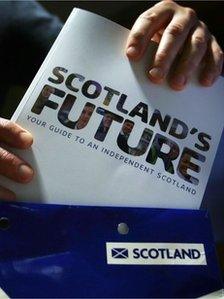What UK debts are Scotland's?
- Published
- comments

This morning's statement from the Treasury that the UK will stand behind all its sovereign debts, whether or not Scotland's people vote for independence, is in a way a statement of the bleedin' obvious.
That debt, all £1.4 trillion of it, is an obligation of the National Loans Fund.
And nothing can change that - whether Scotland were to decide to secede (or, to pick an unlikely corollary, in the event that the People's Liberation Army of West Sussex, miffed about fracking, were to declare UDI).
So why has the Treasury chosen to say that the UK will honour its debts, whatever Scotland does?
Well, it is because investors - whom we may think of as sophisticated and informed (ahem) - have been increasingly asking the Treasury and the Debt Management Office for clarification of the status of the UK's financial obligations in the event of a fracturing of the United Kingdom.
Fears
For example officials have been asked whether UK government bonds, or gilts, would be split into Scottish bonds and Rest of UK bonds.
And what would be the coupon or interest rate on these two new classes of bonds, were that to happen?
No kind of restructuring of the debt, of that sort or any other, is going to happen, the Treasury has now made explicit.
It felt it had to do so because it feared that at some juncture the uncertainty could increase the perceived risk of lending to the UK government - and that could in turn increase the cost for the government of borrowing.
Better therefore to be blunt and clear, that the full £1.4tn would stay as a liability of England, Wales and Northern Ireland - and that there would be no legal requirement on Scottish people to pay any of it.
Nice!
UK government bonds and Treasury bills (short-term debt) would not be split or changed in any way. They would remain as the debts of all us.
That's a bit nice for the Scots, you might think.
Who would not vote for independence if an autonomous, separate Scotland would be set free from the burden of UK debts currently equivalent to 76% of GDP or national income (on the latest estimates by the Office for Budget Responsibility)?
Except that even Alex Salmond and the Scot Nats don't believe that an independent Scotland could, in practice, walk away from its fair share of the UK's debts - even if they would have the legal ability to do so.
Why would it be rational for a Scottish government to take on some of those debts?
Liability
Well because Salmond also wants to negotiate ownership of certain assets (North Sea oil springs to mind). And he wants an agreement on being part of a formal sterling zone, in which Scotland would retain the pound and have some kind of influence over the Bank England's approach to monetary policy.
Perhaps even more importantly, if Scotland were seen to be repudiating all UK debts, investors might be very reluctant to lend even a brass farthing to it as an independent state.
Which is why the Scottish government's White Paper on all this makes it absolutely clear that an independent Scotland would be liable for some of the current national debt.
In the event of independence, Salmond would negotiate for Scotland to service - pay the interest and principal - of a certain portion of the UK's debts.
Fraught
Or to put it another way, Scotland would become a debtor of the rest of the UK, or of the Treasury in London.
And when you put it that way, you can perhaps see why any eventual talks on this would be pretty fraught and difficult.
The following issues would have to be resolved:
1) What share of the debt could fairly be ascribed to Scotland?
2) What interest rate should Scotland pay to the Treasury?
3) Over what time period would the Scottish government be required to repay all its debts to the rest of the UK?
Taking the last first, the time period to repay all the debt, presumably that should mirror the debt profile of UK's current debts - which has an average maturity of 14.5 years.
For the first issue, Salmond's White Paper argues that the share of debts assumed by Scotland could be calculated by reference to the population or the net central government money (fiscal transfers) received by Scotland since 1980.
Riskier?
On both these measures, Scottish debt as a percentage of national income would be below that for the rest of the UK.
But even if that argument were to fly with the Treasury, the chancellor could argue that Scotland should pay a higher interest rate than that paid by the British government - because Scotland, as a smaller economy with no fiscal track record, would be seen as a riskier borrower than the Rest of the UK.
Bankers tell me that markets would probably force Scotland to pay up to 1.5 percentage points more to borrow, initially at least, than the UK currently pays.
A British Chancellor could therefore argue, perhaps, that Scotland should pay that market rate to him too.
And, by the way, this issue - of what investors would charge Scotland for funds - is likely to be a pretty hot one in the referendum campaigns, since it will have a material impact on the country's prosperity in general (the interest rate paid by a government is the benchmark for the rate paid by all borrowers in a country) and Scotland's ability to fund public services in particular.